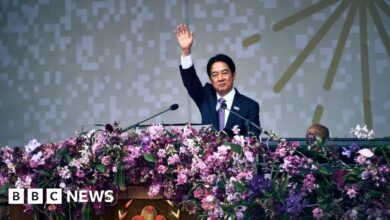Calin Georgescu: Politician who was on brink of becoming Romanian president attacks ‘corrupted regime’

The favourite to win Romania’s controversial presidential election has launched an extraordinary series of attacks in an exclusive interview with Sky News, less than a day after the election was cancelled.
Calin Georgescu, the populist politician who rose from obscurity to the brink of victory, said he had been the victim of a “coup d’etat” that had exposed “the corrupted regime” of his nation.
He said the court that had cancelled the election, pointing to the impact of an alleged Russian interference campaign, was “a dictatorship” designed to protect “the oligarch system that wants to protect what it has stolen”.
Read more:
Top court annuls results of first round of election
Mr Georgescu said: “The constitutional court of Romania… is a Mafia court of Romania.”
“Because nine people decide for 19 million people, this is not acceptable.”
“This does mean coup d’etat. Made by the state which is still in power in Romania.”
He claimed the court had been pressured into annulling the election by a group of European Union and NATO countries intent on subverting democracy in his country, because of their desire to maintain the war in Ukraine.
“They need the war and they want to protect their cheques,” he said to me. “NATO went from defensive to offensive and this we cannot accept. Don’t push me to go to war because it’s not in my interests. But they need war.”
We were the only international media journalists to interview Mr Georgescu in the wake of the cancelled election. We had interviewed him two days earlier, when he seemed confident and relaxed. This time, he came across as more tired and angry, but also determined.
Romania‘s constitutional court released an unprecedented verdict on Friday afternoon that the entire election would be cancelled after naming Russia as the nation behind a hybrid attack designed to magnify Mr Georgescu’s social media campaign.
The court has also claimed that Mr Georgescu, who is not aligned to any political party, broke campaign finance rules after saying that he had spent nothing. I put both of these allegations to him directly, and he denied them both.
Firstly, on Russia, he said: “It doesn’t exist – there aren’t any – any – links between me and Russia. I’ve only got a relationship with Romanian people.
“They cannot accept the victory of the Romanian people. Here elections have been manipulated for 35 years. The power has been stolen.”
He says that he would “totally condemn any foreign interference if it is proven”.
When I mentioned the allegations of campaign fraud, he simply laughs. “They are desperate and they invented everything. My documents prove what I said. I’ve been very transparent.”
He agreed it was possible that his supporters had broken campaign rules but insisted he was wholly innocent.
Mr Georgescu was always seen as an unconventional candidate, but now his contempt for the political establishment bursts from every sentence.
He says the decision of the court to block the election is a sign of his success, claiming that he was on course for a landslide victory.
Mr Georgescu alleges that early ballots cast in overseas territories, before the election was annulled, suggest he would have won more than 80% of the vote, a claim that cannot be verified.
He tells me he still thinks the second round should be held, arguing that “you simply cannot cancel this two days before it should happen”.
He revealed that if he had won the presidency, he was planning to organise a peace conference in the capital Bucharest to which he would have invited leaders including Donald Trump, Volodymyr Zelenskyy, Vladimir Putin and Sir Keir Starmer.
Read more:
Analysis – Russia’s ‘hybrid attack’ on election could trigger NATO response if proven
The pressing question is now – what happens next? Romania is a country desperately divided into two camps – firstly, those who think the court overstepped its authority, including Mr Georgescu’s millions of supporters, various opposition parties and even Elena Lasconi, the centrist politician who he was due to face in the election run-off.
We asked several times to talk to Ms Lasconi, but her team declined.
The second camp includes those who think Mr Georgescu’s rise to prominence was a danger to the state – who think that Romania’s democracy was in danger of being subverted by Russian cyber aggression.
There are even those who think Mr Georgescu should be arrested and investigated. As we leave him after the interview, we see police vehicles parked outside, one of which follows us as we drive away.
He himself is not calling for mass demonstrations, but nor is he opposing the idea. “I will follow whatever the Romanian people decide,” he tells me. “My life is not important. The most important thing is the freedom of my people. This is a battle between good and evil.”





